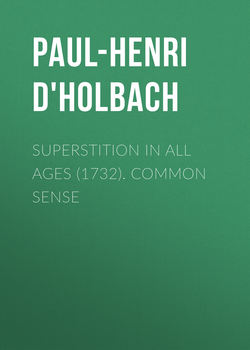Читать книгу Superstition In All Ages (1732). Common Sense - Paul-Henri d'Holbach - Страница 69
COMMON SENSE
LXVI. – BY THE INVENTION OF THE DOGMA OF THE ETERNAL TORMENTS OF HELL, THEOLOGIANS HAVE MADE OF THEIR GOD A DETESTABLE BEING, MORE WICKED THAN THE MOST WICKED OF MEN, A PERVERSE AND CRUEL TYRANT WITHOUT AIM
ОглавлениеThe inventors of the dogma of eternal torments in hell, have made of the God whom they call so good, the most detestable of beings. Cruelty in man is the last term of corruption. There is no sensitive soul but is moved and revolts at the recital alone of the torments which the greatest criminal endures; but cruelty merits the greater indignation when we consider it gratuitous or without motive. The most sanguinary tyrants, Caligula, Nero, Domitian, had at least some motive in tormenting their victims and insulting their sufferings; these motives were, either their own safety, the fury of revenge, the design to frighten by terrible examples, or perhaps the vanity to make parade of their power, and the desire to satisfy a barbarous curiosity. Can a God have any of these motives? In tormenting the victims of His wrath, He would punish beings who could not really endanger His immovable power, nor trouble His felicity, which nothing can change. On the other hand, the sufferings of the other life would be useless to the living, who can not witness them; these torments would be useless to the damned, because in hell is no more conversion, and the hour of mercy is passed; from which it follows, that God, in the exercise of His eternal vengeance, would have no other aim than to amuse Himself and insult the weakness of His creatures. I appeal to the whole human race! Is there in nature a man so cruel as to wish in cold blood to torment, I do not say his fellow-beings, but any sentient being whatever, without fee, without profit, without curiosity, without having anything to fear? Conclude, then, O theologians! that according to your own principles, your God is infinitely more wicked than the most wicked of men. You will tell me, perhaps, that infinite offenses deserve infinite chastisements, and I will tell you that we can not offend a God whose happiness is infinite. I will tell you further, that offenses of finite beings can not be infinite; that a God who does not want to be offended, can not consent to make His creatures' offenses last for eternity; I will tell you that a God infinitely good, can not be infinitely cruel, nor grant His creatures infinite existence solely for the pleasure of tormenting them forever.
It could have been but the most cruel barbarity, the most notorious imposition, but the blindest ambition which could have created the dogma of eternal damnation. If there exists a God who could be offended or blasphemed, there would not be upon earth any greater blasphemers than those who dare to say that this God is perverse enough to take pleasure in dooming His feeble creatures to useless torments for all eternity.
